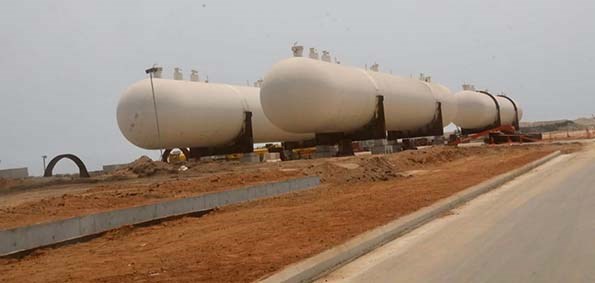This does not mean that the risk of this conflict spreading has ended, on the contrary, but while Gaza is consumed by Israeli bombardment without the fire spreading regionally, the markets cannot help but notice that the world continues to jump and move forward and does not always stop on the side that Angola likes more, Especially since what is happening right now in China and the United States, the world’s largest consumers of crude oil and the two largest global economies, is pushing the Brent barrel down again. 90 USD.
We have in the background the major concerns related to the oil economy, such as Angolan fears, the Hamas terrorist attack on southern Israel on October 7 and the horror of the Israeli response, all with hugely useful images “looping” on screens around the world. . world, which precedes the already announced ground invasion of the sector.
But on the stage, today at least, as Reuters highlights in its daily approach to the markets, unsympathetic data from the Chinese economy, especially factory production, is clearly falling, and from the United States, which has been suffering for months on end. In anticipation of each time the Fed meets to analyze whether or not a new change in key interest rates is appropriate, which, without exception, have been on the rise, albeit with less force.
This data comes from the Asian giant, the second most powerful economy on the planet and which imports the largest amount of crude oil in the world, by a large margin, and the “Americans”, who are the largest economy and largest consumer globally, although their impact on the markets is less because they produce almost all of the energy. Which burns it internally, which is what drives the wheel of fortune of exporting countries, especially those facing the most severe economic crises, and Angola was one of the first of this recommended few. group.
However, this scenario is expected to reverse at any moment, especially since despite the strong and growing criticisms and condemnations of Israel’s horrific and disproportionate response to Gaza, emanating from all over the world, in Tel Aviv there does not appear to be any sensitivity to the requests for… Contain its attacks and bring them into line with the laws of war, as even its key allies, including the United States, have demanded with increasing force.
This means that the risk of this conflict spreading beyond the borders of Gaza and Israel is real, first to the oven sub-regions, such as Lebanon and Syria, and then, as Iran has said loudly, to the rest of the world. The Middle East is where the fields that provide 40% of global oil production are located.
It remains to be seen how long the efforts made by the United Nations, and some important global actors, such as the European Union and China, or even the United States of America, which cannot willingly accept a new “explosion” in prices of raw materials in the markets, will continue. Given their internal economic problems, they will be able to keep the Gaza fuse away from the fuse that connects the powder keg, or crude oil, in the Middle East.
Right now, what really matters, for almost everyone, whether buyers or exporters, is that the Brent barrel, the main reference for the raw materials exported by Angola, was at around 10:00 am on Monday the 30th Luanda time. With a value of $89.56, -1.01% from the previous close, Friday.
For Angola, the calculations are as follows…
For Angola, one of the most dependent producers and exporters of raw materials in the world, due to the lack of economic diversification, maintaining Brent crude at the values of recent months, between 85 and 95 dollars, makes it possible to mitigate the devastating effects of the exchange rate and inflationary crisis it generates. surplus Related Compare the $75 per barrel OGE is set for 2023.
Today, oil accounts for more than 90% of its exports, represents up to 35% of the gross domestic product and guarantees about 60% of the state’s operating expenses.
The President of the Republic, João Lourenço, hopes, in the short and medium term, to achieve the goal of maintaining national production above 1.1 million barrels per day through the “Ndola Sol” or “Agogo Fuel” fields or the “Begonia” or “Cameya” and “Golvinho” projects, which produce More revenues in this sector in order, for example, as has happened for years in countries like Saudi Arabia or the United Arab Emirates, to use oil money to free the national economy from dependence on… oil.
The increase in national production was not hampered by a lack of capabilities, because the estimated reserves amount to nine billion barrels and were already higher than 1.8 million barrels per day a little more than a decade ago, and it is clear that the problem lies in the withdrawal of investments by major companies working in oil. nation.
Indeed, the government of João Lourenço also has reason to be concerned about the ongoing and expected decline in oil production, which is estimated to reach about 20% in the next decade, and is currently just over 1.1 million barrels per day (mbpd), far from Historical maximum of 1.8 million barrels per day in 2008.
Behind this decline, among other factors, is the decline in investment in the entire sector, from research to maintenance, while it is known that the national offshore fields, with operational fields, have been in decline for several years due to their obsolescence, or in other words due to the loss of crude oil that It can be extracted, and multinational companies do not show the interest they have seen in recent decades in investing in the country.
The issue of urgent energy transition, due to climate change, with fossil fuels being the villains, is another factor that blurs the importance of the oil sector in Angola.

“Wannabe internet buff. Future teen idol. Hardcore zombie guru. Gamer. Avid creator. Entrepreneur. Bacon ninja.”

